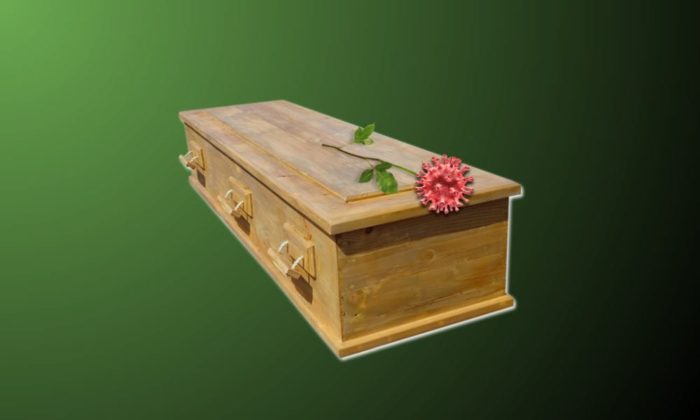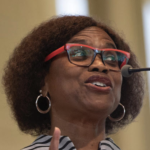
Clergy in these communities have been performing non-stop homegoings, and helping families, loved ones, and communities of the deceased through this valley of anxiety, fear, and death.
The coronavirus eerily reminds me of when I started as a young minister during the AIDS crisis. The enormity of the pain, grief, and anxiety expressed by mourners and the volume of deaths reminds me of those early years.
During the height of the AIDS epidemic in the 1980s, my communities—African-American and LGBTQ+—were dying faster than any of us ministers could funeralize them. News about these two communities did not become front and center until the toll climbed to over 41,000 deaths and over 60,000 diagnoses of full-blown AIDS. Then-President Ronald Reagan didn’t speak up about it until April 1987.
AIDS was thought to be the province of gay males. However, for clergy working or living in black and LGBTQ+ communities, we knew long before the Centers for Disease Control and Prevention revealed in their October 1986 special edition “Morbidity and Mortality Weekly Report” on “AIDS Among Blacks and Hispanics” that the face of the epidemic would be that of an African-American heterosexual sister.
The report stated that 51% of women with AIDS were African-American, and that black women contracted AIDS 13.3 times more frequently than white women. African-American adults had an overall AIDS rate three times higher than white adults.
An old African-American aphorism states, “When white America catches a cold, black America gets pneumonia.” Now the community has added to this statement: “When white America catches COVID-19, black America dies.”
The COVID-19 data on race has revealed that black and brown communities are the hardest hit, here in Boston and across the country. Clergy in these communities have been performing non-stop homegoings (an African-American Christian funeral tradition), and helping families, loved ones, and communities of the deceased through this valley of anxiety, fear, and death.
Citing Boston’s newest COVID-19 data on race and neighborhoods released on Saturday, outlets including NBC10 Boston have reported that of the 7,910 known cases in the city, 2,249 African-American residents were among those who tested positive, comprising 42% of total cases. Stark racial and health care disparities existed before COVID-19, and they remain—despite Madonna announcing in a tweet that COVID-19 is “the great equalizer.”
Myths have also circulated about black people being immune to the coronavirus, suggesting we are of different biology. Sadly, in 2020, we’re seeing the same racist tropes and healthcare disparities, which impede access to adequate care for African-Americans, that played out during the 1918 Spanish flu pandemic. Back then, Jim Crow ordinances institutionalized “separate” and “equal” hospitals and care facilities, which deliberately put African-Americans at a disadvantage. African-American doctors, nurses, and other healthcare workers became overwhelmed by the volume of sick and dying patients, and had to fend for themselves.
The falsity that blacks are immune to COVID-19 also circulated nationwide in 1918. The November 2, 1918 front page of the Cleveland Advocate claimed that black people were not getting the flu under the headline, “Flu Shuns Us, Says Health Doctor.” In truth, African-Americans died at staggeringly higher numbers. Comorbidities plagued us then, as they do today. As US Rep. Ayanna Pressley tweeted earlier this month, “Do you know why African-Americans align with so many COVID-19 co-morbidities? Structural racism. Food deserts=unequal access to healthy & fresh foods= diabetes, heart disease. Enviro injustices mean dirty air, water. Greed & neglect, subpar housing=asthma.”
While the gendered impact of COVID-19 suggests that men fare worse off than women, the news doesn’t give black women a better survival rate. Poor cis-gendered African-American women are the majority of frontline healthcare workers, an essential yet undervalued class. At the same time, many are tasked with holding the family unit together, and data show that this demographic constitutes approximately 40% of evictions. These sisters weigh the risk of going to work to avoid homelessness, another factor putting them at higher risk for contracting the deadly virus.
Cis-gendered black women are the largest group of people I’ve been funeralizing. The next largest group is my trans sisters—youth and adults. They are the most invisible in this pandemic. Their survival and death rates in this crisis will likely be worse than any subgroup within the African-American community, once the data surfaces. Black trans women face high levels of homelessness, poverty, unemployment, and incarceration. They are the majority killed of transgender people. Sadly, we’re likely to lose more with COVID-19.
I’ve been doing funerals since March 25, sometimes two in a day remotely on Zoom. It’s a surrealism difficult to depict. I funeralized many in my community during the AIDS pandemic. I honestly never thought I’d have to do it again.
HELP DIGBOSTON WEATHER THIS STORM AND CONTINUE PROVIDING ARTICLES LIKE THIS ONE
Rev. Irene Monroe can be heard on the podcast and standing Boston Public Radio segment ALL REV’D UP on WGBH (89.7 FM). Monroe’s syndicated religion columns appear and the Boston voice for Detour’s African American Heritage Trail. She is a s a Visiting Researcher in the Religion and Conflict Transformation Program at Boston University School of Theology.

